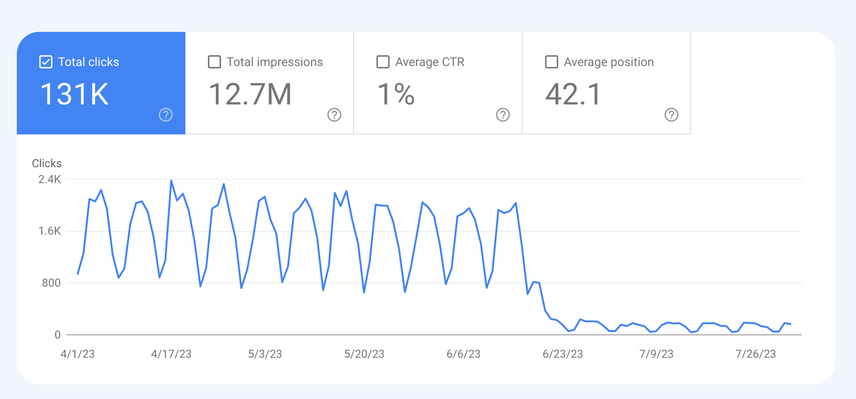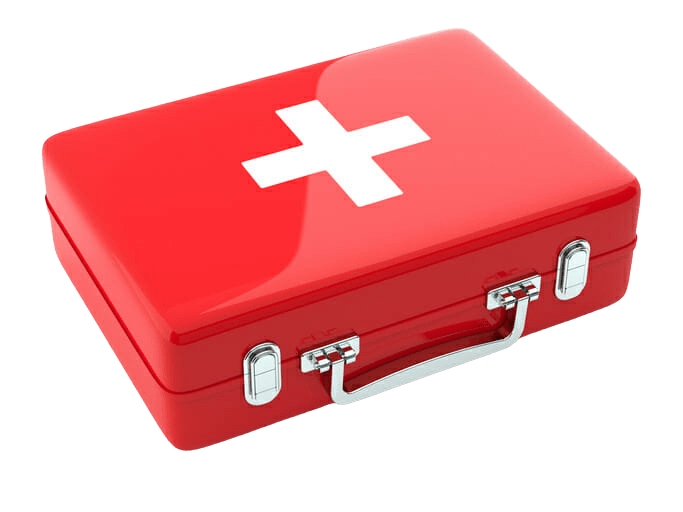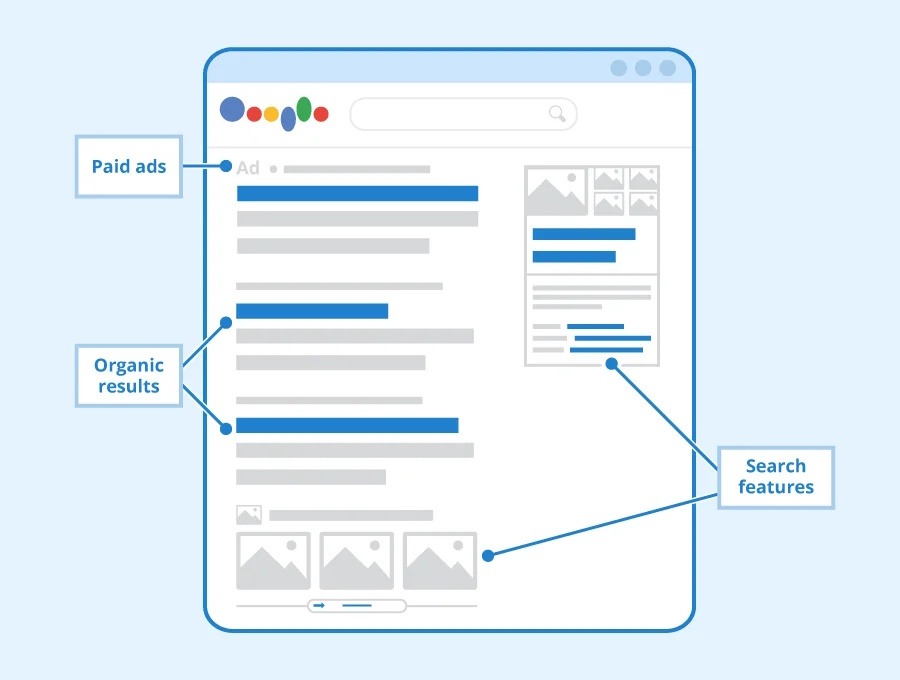The president of a small B2B SaaS finally pushed the panic button. He’d been watching key website pages plummet in search results over the prior three months. They disappeared from Google’s first page entirely for important search terms that previously brought in conversions from organic and paid traffic.
The most stressful part was watching his monthly revenue decline while scrambling to diagnose the exact cause.
Many small business leaders are still skeptical of SEO. To them, it makes sense to leave “peripheral” things like Google rankings and SEO optimization languishing in the background. Until it doesn’t. Because delay can be the kiss of death.
Are you already there? Have your Google rankings dropped so low that you are now in a state of SEO emergency? Here are some tips to get your website off the operating table and back into the land of the living. Or, as we like to call it, Google’s page one.
SEO emergencies hit SMBs hard
SEO emergencies can happen to even the most sophisticated enterprise websites, but more often than not they have a full SEO staff to diagnose the problem and recover. So, what happens when a small or midsize business with lean marketing and IT resources is suddenly confronted by a severe traffic drop or penalty.
Panic, usually. Before we dive into that, let’s look at what would constitute an “SEO state of emergency” for the average small business. The first sign of an impending SEO catastrophe can be seen in a sudden drop in impressions, which are the number of times a user views a website page. You can track these in Google Search Console.

Why do we care about impressions? Because declining impressions usually signal a drop in keyword rankings and a fall from Google’s first page. Impressions almost always come before clicks, traffic and conversions.
Sudden ranking drops
As Google penalty consultants, we’ve noted several factors that consistently contribute to a diagnosis of “SEO failure.” Here are a few:
- A Google algorithm update hit your site particularly hard | For example, an e-commerce website that previously ranked #1 for “custom kitchen cabinets” suddenly drops to page 5, decimating all leads. Sometimes, Google algorithm updates don’t play nice, and SEO teams that have worked hard playing by a certain set of rules now have to play by another. We understand this pain.
- Technical issues like accidentally blocking search engines via “robots.txt” or “noindex” tags | During a site update, a developer can accidentally leave the staging site’s “robots.txt” restrictions or “noindex” tags in place, blocking Google from crawling. For those not on the dev side, robots.txt prevents specified files from getting crawled (although they may get indexed by search engines), and noindex tags allow crawling but prevent indexation. Both are useful when you’re still working on your site and don’t yet want it live.
- A manual penalty from Google for perceived violations | You can receive a manual action notice in Google Search Console for any number of reasons, but for example, unnatural backlinks. These can possibly come from an old SEO agency’s questionable tactics. Automatic action notices are also applied for other Google website infractions such as cloaking (showing one page to search engines and another page to users), expired domain abuse (repurposing an old domain for its traffic while providing a service different from its original intent), keyword stuffing, and more. A Google penalty consultant (like us) can come in handy in these scenarios.
- Critical pages returning 404 errors or being accidentally deleted | After a Content Management System (CMS) update, product category pages can start returning 404 errors instead of redirecting properly. This can result when file paths, databases, and URLs are updated, and the links are not rerouted to the new location.
- Site security breach with hackers injecting malicious content | This occurs when your site is hacked and injected with hidden spam links (pharmacy spam links, for instance), triggering Google’s security warnings. They might also discover the site suddenly showing concerning messages in search results like “This site may be hacked” or “This site may harm your computer,” causing potential customers to avoid clicking. Additionally, when pages are hacked and injected with content, Google begins treating those topics as your business’s areas of expertise. Unfortunately, these injected pages almost always promote content that damages your brand reputation and draws traffic you don’t want associated with your company.
Another nightmare scenario would be discovering competitors have successfully executed negative SEO attacks, building thousands of spammy backlinks to your website or scraping and duplicating your content across the web. The most stressful part would be watching your daily revenue decline while scrambling to diagnose the exact cause. Each hour of delayed resolution would mean lost customers and income.
Are Google penalty consultants worth it?
We know — it can be hard to ask for help. But sometimes, that’s the best thing you can do for a struggling website, company, or brand. The longer you let the problem fester, the less your chances of survival. It’s also understandable that you want to fix the problem yourself. After all, you got yourself into it – why not get yourself out?

From a business owner’s perspective, the decision between do it yourself (DIY) and hiring an expert during an SEO emergency depends on several critical factors:
When to Fix It Yourself:
- If you have strong technical SEO knowledge and experience.
- If the issue is clearly identifiable and straightforward (like an accidental robots.txt block).
- If you have previously handled similar SEO emergencies successfully.
- If you have access to and understand your analytics, Google Search Console, and technical tools.
- If cash flow is extremely tight and you absolutely cannot afford expert help.
When to Hire an Expert:
- If your daily revenue loss exceeds the cost of expert help (this is most common).
- If you’re unsure about the exact cause of the problem.
- If the issue involves a manual penalty or security breach.
- If multiple problems are occurring simultaneously.
- If you’re at risk of making the situation worse through incorrect fixes.
- If you need fast resolution and can’t afford the learning curve.
There’s another option, sort of a hybrid of DIY SEO vs. DFY SEO: you can hire a mentor to guide your existing SEO team to the solution, so that for future situations you’re much better prepared to handle the emergency in-house.
Fixing your car, your washing machine, or your appendix yourself is always an option. However, considering the bandwidth, resources, and expertise at your disposal, it might not always be the best option. Only you can be the judge of that.
The delight of “done for you SEO”
We wouldn’t stand in the way of your personal initiative. However, Google search rankings can be a tricky beast to tame, and there are some definite advantages to done-for-you SEO. Preserving your sanity is just one of them, and preserving your revenue is a strong second.
At TheOAG SEO, we offer out-of-the-box SEO for struggling companies that just want to see their rankings restored. Here’s why:
- Time is Money | Every day the site underperforms means lost revenue. While you might eventually figure out the problem yourself, an expert can typically diagnose and fix issues much faster. If you’re losing $1,000/day in revenue, paying $2,000 for an expert to fix it in 3-5 days is better than taking 2 weeks to fix it yourself.
- Risk Management | SEO mistakes can compound. An expert knows not just what to fix, but what to avoid. They’re less likely to trigger additional issues while fixing the original problem.
- Resource Efficiency | While you’re trying to fix SEO issues, you’re not running your business. Having an expert handle the emergency lets you focus on customer service, damage control, and keeping operations running.
- Future Prevention | A good SEO expert won’t just fix the immediate problem. They’ll help set up monitoring and preventive measures to avoid future emergencies.
The choice is yours, but if you want to stop the bleeding fast and get back into Google’s good graces, real SEO experts are the way to go for a faster, more lasting transformation. To find out how much a Page One ranking on Google is really worth in cold, hard cash, check out our article From Clicks to Cash: Calculating the Value of Higher Google Rankings.








